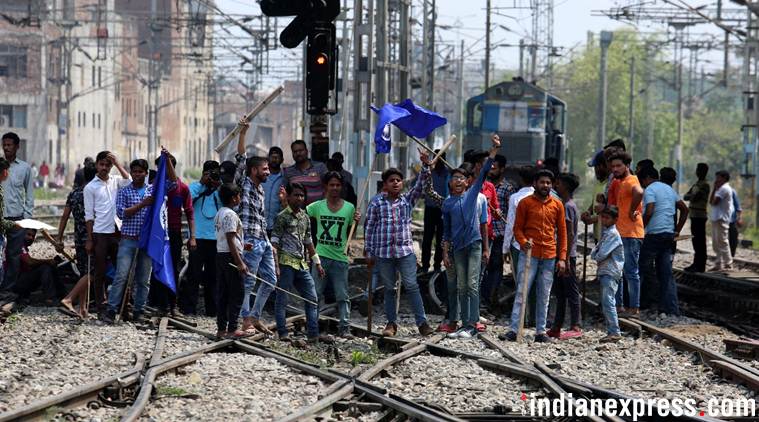 Protests on Railway tracks during the nationwide Bandh in Ludhiana. (Express Photos by Gurmeet Singh)
Protests on Railway tracks during the nationwide Bandh in Ludhiana. (Express Photos by Gurmeet Singh)
Seeking a review of the Supreme Court judgment that forbids arrest without prior sanction for offences under the Scheduled Castes and Scheduled Tribes (Prevention of Atrocities) Act, the government told the top court Monday that potential for misuse was not a valid ground for reading down stringent provisions of the Act and diluting it would deprive SC, ST communities the rights guaranteed under the Constitution.
Approaching the court on the day Dalits protested across the country, the Ministry of Social Justice and Empowerment, in its review petition, said: “Alleged potential of misuse would not deserve to be considered as a valid, justifiable or permissible ground for reading down stringent provisions of the PoA (Prevention of Atrocities) Act, 1989… such a principle, if extended to offences created under other provisions of law, would render the criminal law and criminal procedure system toothless and nugatory” especially when Parliament, after evaluating the working of the Act, decided to make it more stringent and included additional offences under it in 2016.
“…if the legislative mandate by Parliament is for strict implementation for elimination of a particular menace, then it would not be permissible to dilute the implementation of any such social welfare legislation by resorting to any exercise described as balancing and given in the form of laying down provisions. Such an exercise would not be in conformity with the settled demarcation of jurisdiction between the legislative functioning of the Parliament and the discharge of judicial functions by rendering interpretation by courts,” the petition stated.
Review petitions are usually heard in the chamber. The government, however, requested that the instant review be heard in open court. The Centre is likely to press for early hearing of the plea.
In its March 20 judgement, the Supreme Court noted instances of abuse of the Act and laid down stringent safeguards, including provisions for anticipatory bail and a “preliminary enquiry” by a DSP before registration of case under the Act. If the accused is a public servant, the person can only be arrested after permission from the appointing authority. And if the accused is not a public servant, prior permission of the SSP of the district will be required, the court ruled.
Opposing this, the Centre said the judgment would have “wide ramifications” and additional procedural safeguards introduced by it “would result in impeding strict interpretation” of the Act “leading to inevitably diluting” its efficacy.
There were also procedural difficulties since there may not be adequate number of DSP-level officers in many states and Union Territories.
On the Supreme Court direction that those accused of offences under the Act should be entitled to anticipatory bail, the Centre said “Section 18… is the backbone of the Act as it enforces an inherent deterrence and instils sense of protection amongst members of the SCs and STs” and that “any dilution thereof would shake the very objective of the mechanism to prevent offences of atrocities”. Section 18 of the Act says the provision for anticipatory bail will not be available for offences under the Act.
Referring to statistics, the Centre’s petition said offences against SCs and STs “have been disturbingly continuing”. According to data of the National Crime Records Bureau (NCRB), 47,388 cases were registered in the country under the Act in conjunction with Indian Penal Code during 2016. “Further only 24.9% of the said cases ended in conviction and 89.3% were pending in courts at the end of the year 2016,” it said.
“In the given situation of continuing offences of atrocities against members of SCs and STs, it would be more significant and meaningful to affirm the reliance and trust of the members of the SC and ST on the statute and not make it easier for the accused to get away from arrest by imposing a preliminary inquiry,” the government said.
Citing “misuse” of the law, the Supreme Court, in its judgment, said “to avoid false implication of an innocent, a preliminary enquiry may be conducted by the DSP concerned to find out whether the allegations make out a case under the Atrocities Act and that the allegations are not frivolous or motivated”,
The government contended that low conviction and high acquittal rate in cases under PoA Act is due to “several factors like delay in lodging FIR and witnesses and complainants becoming hostile, absence of proper scrutiny of the cases by the prosecution before filing the chargesheet in the court, lack of proper presentation of the case by the prosecution and appreciation of evidence by the Court”.
The judgment, it submitted, “did not appreciate the data and the situation in the correct perspective”.
It said the court ought to have appreciated that “since offences of atrocities affect dignity and life of members of SC and ST, FIR needs to be registered at the earliest, so that the investigation commences fast without any room for accused to seek anticipatory bail and that admissible relief amount due to be paid to the victim/dependent, on registration of the FIR is also timely paid”.
Procedural checks like preliminary enquiry ordered by the court “would tend to reduce the rates of registration of cases, conviction, increase pendency and per se would act as deterrent in even filing of FIRs”.